Photographs: Susana Vera/Reuters
In an isolated spot on the coast of south-east Spain dotted with characterless golf resorts and sprawling fruit farms, a small group of dedicated women boxers and their male coach are chasing their Olympic dream.
The five young fighters, based at a high-performance sports centre next to a salty lagoon called Mar Menor, are training hard ahead of next month's world championships in Qinhuangdao, China, where competition will be fierce for the precious 24 qualification slots - eight in each of the three weight categories - for this year's summer Games.
- Clothing options added for women's beach volleyball
Women's boxing will make its Olympic debut in London and while the Spanish hopefuls know how tough it would be to even qualify, they are filled with pride that the sport they have dedicated their lives to is finally getting the recognition.
"It's a historic moment," Yasmina Musa Amakhtari, who fights in the flyweight category, said after a light morning training session in the centre's converted gymnasium.
"In my opinion it should have been done much earlier," the 24-year-old from Torremolinos added. "I think it will raise the sport's profile and encourage more women to get involved."
'Nothing is impossible and anything can happen'
Image: Spanish boxer Jennifer Miranda (right) and fellow boxer Yasmina Musa trainPhotographs: Susana Vera/Reuters
A three-times national champion whose parents are from the autonomous Spanish city of Melilla on the north coast of Morocco, Amakhtari started boxing to keep herself fit but with time and success, she decided to make it a career despite the initial resistance from her family and friends.
"At the beginning they saw it as a very aggressive sport but I showed them more about what boxing involves and they changed their minds," she said with a smile.
- Tyson-loving Devendro tempers aggression for gold dreams
Amakhtari and her compatriots will need all the luck in Qinhuangdao where being paired with a world champion in the first round could mean early elimination.
"It's going to be very difficult because boxers in other countries have been competing for many years, whereas here in Spain we did not set up the team until we knew the Olympic weights," she said.
"They have a big advantage because of that but nothing is impossible and anything can happen.
"If we have good fortune in the draw then one of us could qualify but it's all a matter of luck as you could get a world champion straight off."
130 nations have registered competitive female boxers
Image: Spanish boxer Marta Branas takes a moment to rest during a training sessionPhotographs: Susana Vera/Reuters
Women boxers have been struggling for decades to win the same recognition as their male counterparts and were rewarded in August 2009 when the International Olympic Committee (IOC) announced they would be able to compete in London.
The sport also got a boost from the publicity around Clint Eastwood's 2004 Oscar-winning film "Million Dollar Baby" on a female boxer and her trainer.
- Boxers Shiva, Sumit eye Olympic glory after gold
Even though the International Boxing Association (AIBA) had been staging women's world championships since 2001, it remained the only sport in the summer Games in which no women were involved, although it was included as a demonstration event in 1904.
World championships are staged every two years and around 130 nations have registered competitive female boxers.
The AIBA rules are the same as the men's version of the sport with minor exceptions.
Boxers aged 18 or older have to provide a medical certificate stating they are not pregnant before they can fight and they are allowed, although not obliged, to wear breast and pubic protectors. Men must wear a cup protector for their genitals.
'The economic issue is the biggest problem we have'
Photographs: Susana Vera/Reuters
As his charges worked out with punch bags and skipping ropes, Spain coach Jose Gutierrez, a six-times national champion, hoped at least one would clinch a berth for London.
However, as with many minority sports in countries struggling through the global financial crisis, money is tight and Gutierrez said a lack of funds had prevented the team from competing in as many tournaments as he would have liked.
- Mary Kom in shipshape for Olympic challenge
"The economic issue is the biggest problem we have," the 36-year-old from Cordoba said.
"We cannot box as much as we want to and in the long term you notice the impact.
"But I have faith in my girls. We have already been to one world championships and with a positive draw and with the level they have I think they are going to get to China in good shape."
'Hope is the last thing you lose'
Image: Argentine born boxer Tamara Fabiana Garcia gets punched in the face by fellow boxer Jennifer Miranda during a training sessionPhotographs: Susana Vera/Reuters
Gutierrez said Spain's brightest prospect is probably Tamara Garcia, a sturdy 23-year-old born in Buenos Aires who will compete in the 69-75 kg middleweight division.
The soft-spoken boxer, who lists Muhammad Ali and his daughter Laila as inspirations, is realistic about her chances of qualification.
- Check out the London Olympics athletes' village
"It's going to be tough but anything can happen and hope is the last thing you lose," she said .
"The difficult thing is to qualify. Once you are in there is always a chance (to win a medal)."

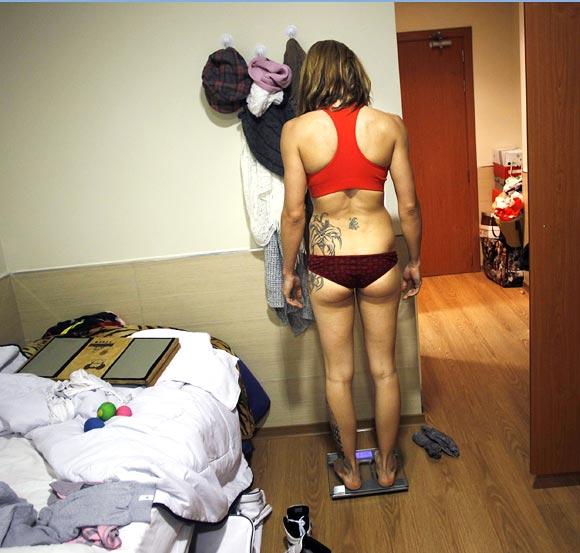
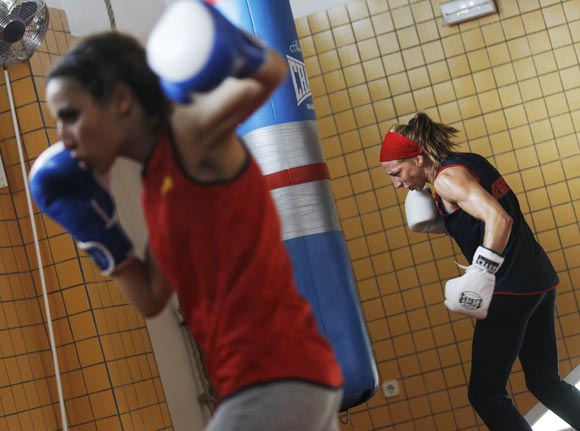
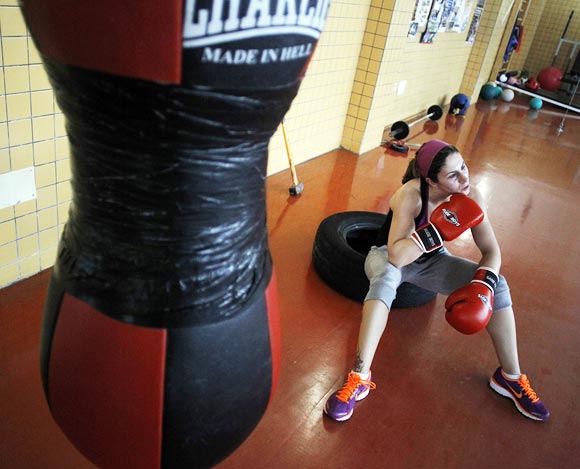
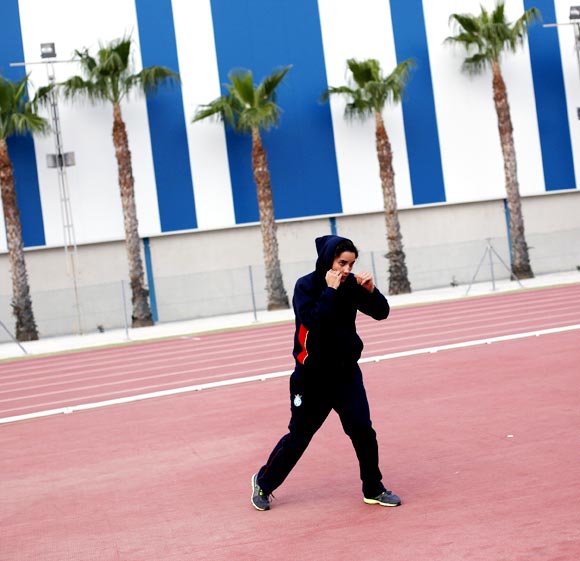
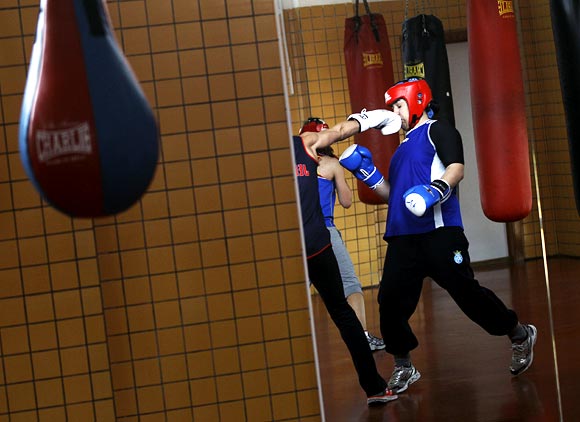

Comment
article